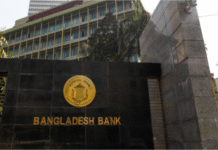Fund disbursement to complete by next month: BB

As many as 2,062 large companies have received low-cost loans worth Tk 25,461 crore from the central bank’s stimulus package for big borrowers in the industrial and service sectors.
Experts say the quick fund disbursement by the lenders has had a positive impact on the ongoing recovery process of the business sector, which had faced a major setback during the pandemic-induced lockdown.
As of September 17, the disbursed fund accounted for 77.15 per cent of the Tk 33,000 crore stimulus package, according to data from the central bank.
“Nevertheless, the central bank should immediately carry out a study to confirm whether the companies are using the stimulus fund properly,” said Ahsan H Mansur, executive director of the Policy Research Institute of Bangladesh.
“There is no doubt that the stimulus fund has brought a positive output for the economy. But we have to ensure whether the fund is being used correctly.”
Against this backdrop, the central bank will stop the disbursements through the lenders which will fall short at the end of the month and give the responsibility of giving out the remainder amounts to the banks who fared well, said Abu Farah Md Naser, an executive director of the Bangladesh Bank.
The central bank asked the 18 banks on Thursday to send a letter within three working days explaining the reasons behind their poor performance.
“Disbursement of the whole stimulus package will have to be completed within the next month at any cost in the interest of the quick recovery of the financial sector,” Naser said.
The financial sector has recovered 60-70 per cent in recent months and the rest is dependent on the proper implementation of the stimulus packages, said Mansur, also a former high official of the International Monetary Fund.
The garment sector received immense support from the stimulus fund and it may enjoy a full turnaround from the first quarter next year, he said.
The central bank can recruit a competent organisation to measure the package’s impact in the financial sector, Mansur said.
The banking sector has been lacking corporate governance for years and large borrowers are mainly responsible for the financial health of some banks turning vulnerable, he said.
Naser said the central bank would conduct such a study following the disbursement of the fund.
Of the total distributed fund, lenders have given out Tk 20,057 crore as working capital and Tk 5,404 crore for the payment of garment workers’ salaries.

The central bank is now supervising the fund disbursement through a special monitoring cell, which has started taking decisions to complete the distribution in a quick manner, Naser said.
The BB formed the stimulus package on April 12. Large borrowers of the two sectors — industrial and service – are each being allowed to avail a maximum of 30 per cent of what they had as working capital in December 2019.
Under the stimulus package, banks will get an interest subsidy of 4.5 per cent on the disbursed loans, which the end-users will avail at 9 per cent.
The banking regulator has also formed a refinance scheme of Tk 15,000 crore for the smooth implementation of the stimulus package, bringing huge relief to the cash-strapped banking sector.
Under the refinance scheme, lenders will get funds in the form of working capital at 4 per cent interest from the BB. In order to receive funds from the refinance scheme, banks will have to give at least 50 per cent of each loan from their coffers.
Borrowers now get funds at a low-cost due to the central bank’s stimulus package, which has given a great boost to the financial sector, said Syed Mahbubur Rahman, managing director of Mutual Trust Bank.
Lenders are enjoying available liquid funds thanks to the efforts of the central bank, which injected a large amount of fund in many forms, especially the stimulus packages, he said.
Private sector credit growth has been on the rise thanks to the implementation of the packages, said Rahman, also a former chairman of the Association of Bankers, Bangladesh, a forum of banks’ chief executives.
Year-on-year credit growth stood at 9.2 per cent in July, up 8.61 per cent from a month earlier.
However, demand for loans is still lower than what was in the pre-Covid-19 period as they are yet to regain full confidence, said Rahman.
Mansur said the financial sector would require more than one year to get back its full tempo.
The service sector will not enjoy a full turnaround until a vaccine for the novel coronavirus is available for the people on a wide scale, he said.
The export sector has almost attained 80-90 per cent of the recovery riding on the stimulus package, said Emranul Huq, managing director of Dhaka Bank.
“We were initially afraid of the recession. But dark clouds are moving away from our skies, helping the banking sector get back its confidence as well,” he said.
A good number of borrowers have already started paying back their dues, playing a role in strengthening the financial health of banks, Huq said.









